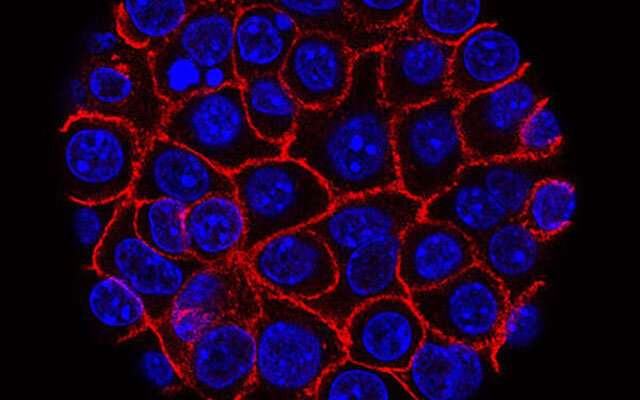This article has been reviewed according to Science X's editorial process and policies. Editors have highlighted the following attributes while ensuring the content's credibility:
fact-checked
peer-reviewed publication
trusted source
proofread
Italian scientists reveal a mechanism of resistance pancreatic cancer cells use to evade therapies

Italian scientists from Università Cattolica at Rome have discovered an important genetic mechanism that pancreatic cancer cells employ to evade therapies, paving the way to new drugs for a killer disease. The tumor evades treatments by implementing a "favorable genetic reshuffling," strategically playing its best cards to thwart cures.
This finding is the result of a study published in the journal Cell Reports Medicine, coordinated by Claudio Sette, Professor of Human Anatomy at the Catholic University, and Director of the Organoids Facility at the Policlinico Universitario A. Gemelli IRCCS.
"We have discovered a mechanism based on the regulation of messenger RNAs that contributes to chemotherapy resistance," Sette explains. "There are already RNA-targeting drugs, used with other medical indications, to counteract this type of regulation. These drugs could potentially be developed as anti-tumor agents for resistant patients."
Pancreatic cancer affects approximately 500,000 people worldwide each year. Despite being the 14th most common cancer by incidence, today it is unfortunately the seventh leading cause of cancer-related death. The five-year survival rate is less than 10%, mostly limited to patients who are eligible for surgery (around 20–30% of the total).
When the genetic code is transcribed into RNA for protein synthesis, "alternative splicing" can occur. This means that different transcripts can be produced from the same gene, depending on the selected genetic "cards" (exons, the gene's coding part for amino acids in proteins) to be "played." Splicing leads to the production of diverse proteins with different roles through the alternative assortment of exons of the original gene. Splicing is generally altered in tumors, including pancreatic cancer.
"Comparing pancreatic tumors of different subtypes," Professor Sette explains, "we observed that the therapy-resistant cancer is associated with a specific splicing regulation, leading to the synthesis of proteins associated with resistance to chemotherapies. Our study... has also identified a splicing regulator called 'Quaking' that is expressed in more aggressive pancreatic tumors and promotes the synthesis of proteins conferring chemoresistance."
There are already existing splicing-regulating drugs that could be potentially employed for this type of cancer; including therapies for individual splicing events, such as the drug nusinersen that is currently used in spinal muscular atrophy.
"Our discovery opens up new treatment possibilities for a type of tumor that generally does not respond to existing therapies," the professor concludes.
More information: An alternative splicing signature defines the basal-like phenotype and predicts worse clinical outcome in pancreatic cancer, Cell Reports Medicine (2024). DOI: 10.1016/j.xcrm.2024.101411. www.cell.com/cell-reports-medi … 2666-3791(24)00034-X


















